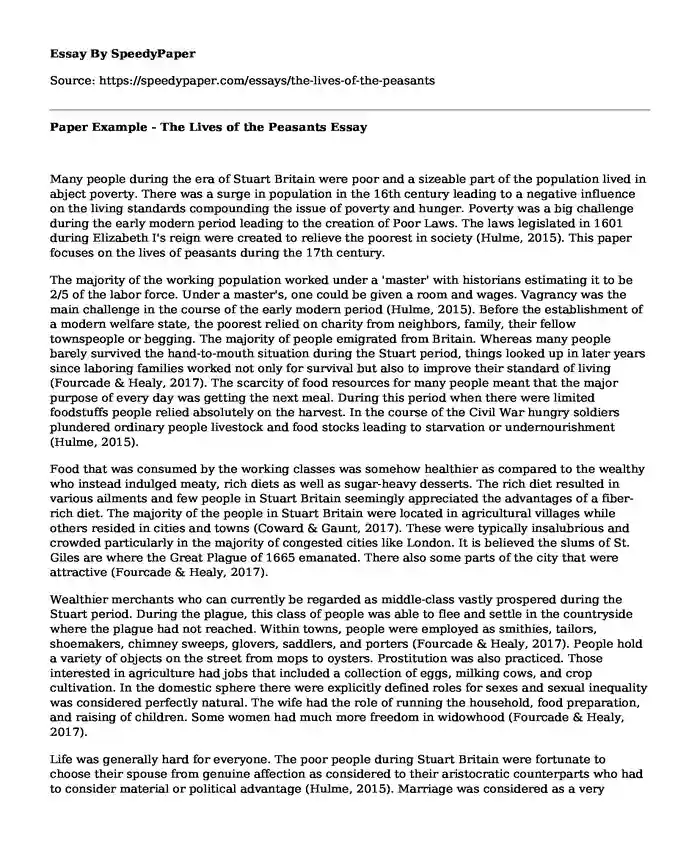Many people during the era of Stuart Britain were poor and a sizeable part of the population lived in abject poverty. There was a surge in population in the 16th century leading to a negative influence on the living standards compounding the issue of poverty and hunger. Poverty was a big challenge during the early modern period leading to the creation of Poor Laws. The laws legislated in 1601 during Elizabeth I's reign were created to relieve the poorest in society (Hulme, 2015). This paper focuses on the lives of peasants during the 17th century.
The majority of the working population worked under a 'master' with historians estimating it to be 2/5 of the labor force. Under a master's, one could be given a room and wages. Vagrancy was the main challenge in the course of the early modern period (Hulme, 2015). Before the establishment of a modern welfare state, the poorest relied on charity from neighbors, family, their fellow townspeople or begging. The majority of people emigrated from Britain. Whereas many people barely survived the hand-to-mouth situation during the Stuart period, things looked up in later years since laboring families worked not only for survival but also to improve their standard of living (Fourcade & Healy, 2017). The scarcity of food resources for many people meant that the major purpose of every day was getting the next meal. During this period when there were limited foodstuffs people relied absolutely on the harvest. In the course of the Civil War hungry soldiers plundered ordinary people livestock and food stocks leading to starvation or undernourishment (Hulme, 2015).
Food that was consumed by the working classes was somehow healthier as compared to the wealthy who instead indulged meaty, rich diets as well as sugar-heavy desserts. The rich diet resulted in various ailments and few people in Stuart Britain seemingly appreciated the advantages of a fiber-rich diet. The majority of the people in Stuart Britain were located in agricultural villages while others resided in cities and towns (Coward & Gaunt, 2017). These were typically insalubrious and crowded particularly in the majority of congested cities like London. It is believed the slums of St. Giles are where the Great Plague of 1665 emanated. There also some parts of the city that were attractive (Fourcade & Healy, 2017).
Wealthier merchants who can currently be regarded as middle-class vastly prospered during the Stuart period. During the plague, this class of people was able to flee and settle in the countryside where the plague had not reached. Within towns, people were employed as smithies, tailors, shoemakers, chimney sweeps, glovers, saddlers, and porters (Fourcade & Healy, 2017). People hold a variety of objects on the street from mops to oysters. Prostitution was also practiced. Those interested in agriculture had jobs that included a collection of eggs, milking cows, and crop cultivation. In the domestic sphere there were explicitly defined roles for sexes and sexual inequality was considered perfectly natural. The wife had the role of running the household, food preparation, and raising of children. Some women had much more freedom in widowhood (Fourcade & Healy, 2017).
Life was generally hard for everyone. The poor people during Stuart Britain were fortunate to choose their spouse from genuine affection as considered to their aristocratic counterparts who had to consider material or political advantage (Hulme, 2015). Marriage was considered as a very important social institution. Life expectancy was shorter as compared to the present day. Childbirth was dangerous as well as potentially fatal even for the mother and child mortality was very high. 10 to 25 women in every 1000 succumbed to death due to childbirth in the course of the Stuart period (Hulme, 2015).
References
Coward, B., & Gaunt, P. (2017). The Stuart Age: England, 1603-1714. Taylor & Francis.
Fourcade, M., & Healy, K. (2017). Classification situations: Life-chances in the neoliberal era. Historical Social Research/Historische Sozialforschung, 23-51.
Hulme, D. (2015). Global poverty: global governance and poor people in the post-2015 era. Routledge.
Cite this page
Paper Example - The Lives of the Peasants. (2023, Apr 23). Retrieved from https://speedypaper.net/essays/the-lives-of-the-peasants
Request Removal
If you are the original author of this essay and no longer wish to have it published on the SpeedyPaper website, please click below to request its removal:
- Essay Example on Supporting Commercialization of Technology-Enabled Cancer Solutions
- Free Essay with the Fusion Centers Research
- Free Essay Sample on Negatiation
- Comparing Essay Sample on the Poetry of Elizabeth Barrett Browning and Charles Baudelaire
- Teaching Essay Sample: Thematic Unit Lesson Plan
- Essay Sample on Effects of Foreign Accounting Standards
- Essay Example: Human Services Initiatives
Popular categories





